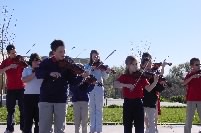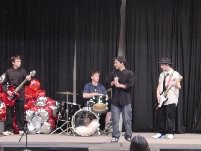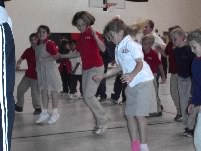|
Student Activities
Field Experiences:
Field trips or field experiences are a privilege. In order
for any student to participate in a field experience, he/she must
be a cooperative student and interested in learning. Students
who have not earned the privilege may not participate. Grades may
or may not affect field experience privileges. Students are expected
to abide by the same rules on any trip as given in the classroom.
It is imperative that respect and obedience is given to the adults
conducting the trip, this includes being attentive and following
all instructions. Inappropriate behavior, e.g. fighting, disrupting,
or damaging other's property. Insubordination, or violations of
the laws of the state, or country where the student is visiting,
is grounds for immediate expulsion. Students will wear uniform
clothing representing the school unless the field experience demands
a different type of clothing (e.g. Levi's for wading through
swamp or dirty work, etc.)
Student Council
The student council is voted into office by an "electoral college"
of peers. Electoral representatives are either elected of appointed
in their "home room" class under the direction of the
teacher. Electoral representatives cannot hold an office,
but are "wise" students of the highest integrity who can
see leadership qualities in their peers. The Electoral group meets
and selects a panel of potential student candidates who are then
interviewed by the electoral college members. Council members are
then chosen and a "call" is made to see whether the candidate(s)
will accept the position. This is the manner in which the Founding
Fathers selected "wise, honest and virtuous" leaders to
guide the country. It is not a "popularity" vote of the
Academy nor a pure democratic vote. A potential student officer
must have and maintain a "C" Grade Point Average
or better, and must not be a behavioral problem in any class.
The Officers and their jobs:
President:
The President of the student council conducts all meetings and is
in charge of all business not specifically assigned to other members
of the student council. Age: 15 - up.
1st Vice President:
The 1st Vice President is over the planning and scheduling of assemblies
and spirit days. He/she also takes over the responsibilities of
the President in his/her absence. Age: 14 - up.
2nd Vice President:
The 2nd Vice President is over the planning, coordinating and scheduling
of dances and the club activities. This person is responsible for
the Student Store and Athletic activities. He/she also assumes responsibilities
of President in the absence of the President and 1st Vice President.
Age: 14 - up.
Secretary:
The Secretary takes the minutes in all student council meetings,
reviews suggestions from the suggestion box, and makes student council
additions to the daily announcements. Age: 13 - up.
Middle School Representative
This person represents the middle school, it's desired activities
and gives input into the Council. Must be an 8th Grader.
Historian/Treasurer
The Historian/Treasurer accounts for all moneys allotted to the
student council. He/she also writes articles representing the Student
Council in the student newspaper and local newspaper as well as
maintaining a scrapbook of school and community events at American
Heritage Academy.
Cultural Arts Chairperson:
The Cultural Arts Chairperson promotes and helps coordinate all
cultural events including Spirit Days, Art Days, Health Days, etc.
He/she will give counsel for appropriate dance and activity music.
Sports:
Sports programs are made available to students based on interest
by students and the availability of a knowledgeable advisor/coach.
Sports at American Heritage Academy are designed to promote the
student's sense of personal greatness through helping them personally
excel. Participating students must have an overall "C average"
grade in order to play. Programs that may be available are volleyball,
soccer, basketball, softball and cheer leading Students whose behavior
is inappropriate at games or in school will NOT be allowed to participate.
All students who qualify will play.
Clubs:
Students may have clubs by submitting a potential club membership
list with at least 6 members and a club constitution outlining the
purpose of the club to the Administration. Each club must have a
sponsoring advisor to the club (a teacher). Club objectives can
include service, non-proselytizing religious organizations, political
issues, cultural studies, mutual interests, mutual goals, or study
purposes. Once a club is organized, they can have activities, fund-raisers,
etc. using the school facility. The Administration retains authority
to veto and revoke any club at AHA.
Dances:
Student Council or other clubs may plan a dance.
Enrichment Days and Activities:
Prior to Spring Break, and during the last two days of school (in
May), students participate in a program of Art and Health: gallery
tours, hands-on ceramics, cooking, stained glass, painting, health
classes offered by Doctors and Dentists, personal hygiene, abstinence
base "sex-ed," and related classes. The last day of school culminates
with yearbook signing, "wet" fireman games, swimming, and Parent
Council provided lunch. AHA has guest speakers, special programs,
student council sponsored dances, spirit days, awards and recognition
programs. Field experiences include trips to Boston, Washington
D.C., Mexico and California.
|



